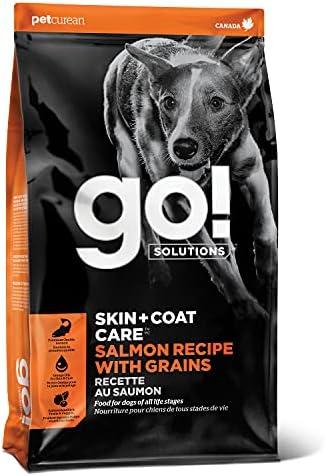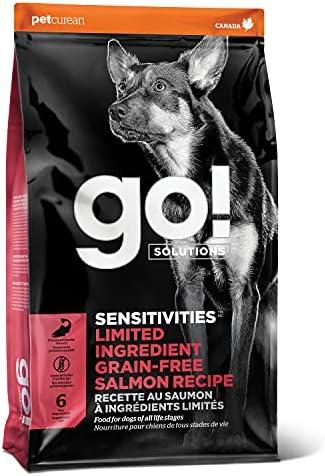Max, a spirited golden retriever, was always the life of the party until he started scratching incessantly. His owner, Sarah, felt helpless watching him suffer. After consulting a vet, she learned that a diet rich in omega-3 fatty acids, like salmon and flaxseed, could soothe his itchy skin. She switched his food, and within weeks, Max was back to his playful self, his coat shiny and healthy. If your dog is itching, consider their diet—what they eat can make all the difference in their comfort and happiness.
Contents
- Understanding the Causes of Itchy Skin in Dogs
- Nutritional Solutions to Alleviate Itchiness
- Top Recommended Ingredients for a Healthy Diet
- Consulting with Your Veterinarian for Tailored Dietary Advice
- Q&A
Understanding the Causes of Itchy Skin in Dogs
Itchy skin in dogs can stem from a variety of underlying causes, making it essential for pet owners to understand the potential triggers. One of the most common culprits is **allergies**, which can be caused by environmental factors such as pollen, dust mites, or mold. Additionally, food allergies can lead to skin irritation, often manifesting as persistent itching. Identifying the specific allergen is crucial, as it allows for targeted dietary adjustments that can alleviate discomfort.
Another significant factor contributing to itchy skin is **parasites**. Fleas, ticks, and mites can cause intense itching and irritation, leading to excessive scratching and potential skin infections. Regularly checking your dog for these pests and maintaining a consistent flea and tick prevention regimen is vital. If parasites are the issue, addressing them promptly can help restore your dog’s skin health and comfort.
In some cases, **skin infections** may be the root cause of itching. Bacterial or fungal infections can develop due to broken skin from scratching or as a secondary reaction to allergies. These infections often require veterinary intervention and may necessitate specific treatments, including medicated shampoos or antibiotics. Understanding the signs of infection, such as redness, swelling, or discharge, can help you seek timely care for your furry friend.
Lastly, **underlying health conditions** such as hormonal imbalances or autoimmune disorders can contribute to itchy skin. Conditions like hypothyroidism or Cushing’s disease may require a comprehensive approach to treatment, including dietary changes and medication. Consulting with a veterinarian is essential to diagnose these issues accurately and develop a tailored plan that addresses both the symptoms and the root cause of your dog’s discomfort.
Nutritional Solutions to Alleviate Itchiness
When it comes to addressing itchiness in dogs, the right nutrition can make a significant difference. Incorporating **anti-inflammatory foods** into your dog’s diet can help soothe irritated skin and reduce the urge to scratch. Foods rich in omega-3 fatty acids, such as:
- Salmon
- Flaxseed
- Chia seeds
These ingredients not only promote a healthy coat but also support overall skin health by combating inflammation from within.
Another essential component to consider is the inclusion of **antioxidant-rich fruits and vegetables**. These foods can help bolster your dog’s immune system, making it more resilient against allergens and irritants. Some excellent options include:
- Blueberries
- Sweet potatoes
- Carrots
These nutrient-dense choices can provide your furry friend with the vitamins and minerals necessary to maintain healthy skin and reduce itchiness.
Additionally, a diet that is low in **common allergens** can be beneficial for dogs prone to skin issues. Many dogs are sensitive to ingredients like grains, dairy, and certain proteins. Opting for a **limited-ingredient diet** featuring novel proteins such as:
- Duck
- Rabbit
- Venison
can help identify and eliminate potential triggers, leading to a noticeable reduction in itchiness.
don’t overlook the importance of **hydration** in maintaining skin health. Ensuring your dog has access to fresh water at all times can help keep their skin hydrated and less prone to dryness and irritation. You might also consider adding **broth** or **coconut oil** to their meals, which can enhance moisture levels and provide additional nutrients that support skin health.
Top Recommended Ingredients for a Healthy Diet
When it comes to alleviating itchiness in dogs, the right ingredients can make all the difference. Incorporating **high-quality proteins** into your dog’s diet is essential. Look for sources such as **chicken, turkey, fish, and lamb**. These proteins not only provide the necessary amino acids for skin health but also help in building a strong immune system, which can combat allergens that cause itching.
In addition to proteins, **healthy fats** play a crucial role in maintaining skin moisture and reducing inflammation. Ingredients rich in omega-3 and omega-6 fatty acids, such as **flaxseed oil, fish oil, and chicken fat**, can significantly improve your dog’s skin condition. These fats help to create a barrier against irritants and can soothe existing skin irritations, making your furry friend more comfortable.
Don’t overlook the importance of **whole grains and vegetables** in your dog’s diet. Ingredients like **brown rice, sweet potatoes, and peas** provide essential nutrients and fiber that support digestive health. A well-functioning digestive system can help minimize allergic reactions and skin irritations, as many skin issues stem from food sensitivities. Additionally, vegetables such as **carrots and spinach** are packed with vitamins and antioxidants that promote overall health.
Lastly, consider incorporating **probiotics** into your dog’s diet. These beneficial bacteria can enhance gut health, which is closely linked to skin health. Look for dog foods that include ingredients like **yogurt or fermented vegetables**. Probiotics can help balance the gut microbiome, potentially reducing allergic reactions and improving your dog’s skin condition. By focusing on these key ingredients, you can create a diet that not only satisfies your dog’s nutritional needs but also alleviates their discomfort from itching.
Consulting with Your Veterinarian for Tailored Dietary Advice
When it comes to addressing your dog’s itchy skin, consulting with your veterinarian is an essential step in finding the most effective dietary solutions. Every dog is unique, and their dietary needs can vary significantly based on factors such as age, breed, health status, and specific allergies. A veterinarian can provide insights tailored to your dog’s individual condition, ensuring that you choose the right food to alleviate discomfort.
Your veterinarian may recommend a **hypoallergenic diet** or a **limited ingredient diet** to help identify and eliminate potential allergens from your dog’s meals. These specialized diets often contain novel protein sources and carbohydrates that your dog has not been exposed to before, reducing the likelihood of an allergic reaction. By working closely with your vet, you can determine the best approach to introduce these diets gradually, monitoring your dog’s response to identify any improvements in their skin condition.
In addition to recommending specific food types, your veterinarian can also guide you on the importance of **nutritional balance**. A well-rounded diet rich in essential fatty acids, vitamins, and minerals can significantly impact your dog’s skin health. Your vet may suggest incorporating supplements such as omega-3 fatty acids, which are known for their anti-inflammatory properties, to further support your dog’s skin and coat health.
regular follow-ups with your veterinarian are crucial to assess the effectiveness of the dietary changes. This ongoing dialogue allows for adjustments based on your dog’s progress and any emerging symptoms. By maintaining an open line of communication, you can ensure that your dog receives the best possible care and dietary support, leading to a happier, itch-free life.
Q&A
-
What types of food can help alleviate my dog’s itching?
Foods rich in omega-3 fatty acids, such as salmon or fish oil, can significantly reduce inflammation and itching. Additionally, hypoallergenic diets that exclude common allergens like beef, chicken, and dairy can be beneficial.
-
Are there specific ingredients I should look for?
Look for ingredients like sweet potatoes, brown rice, and peas, which are gentle on the digestive system. Also, consider foods with probiotics to support gut health, as a healthy gut can improve skin conditions.
-
Should I avoid any particular foods?
Yes, it’s advisable to avoid foods that contain artificial additives, preservatives, and common allergens such as wheat, soy, and corn. These can exacerbate itching and lead to further skin irritation.
-
Can I use supplements to help with my dog’s itching?
Absolutely! Supplements like fish oil and omega-3 fatty acids can be very effective in reducing itching. Always consult your veterinarian before starting any new supplements to ensure they are appropriate for your dog’s specific needs.
choosing the right food for your itchy dog is crucial for their comfort and health. By prioritizing high-quality ingredients and consulting with your veterinarian, you can help alleviate their discomfort and enhance their quality of life.

大家好,我是彼得潘,專業的手法身體治療師。我喜歡探索和研究各種主題,並透過與人工智慧的合作分享專業、實用、有趣的文章。我們定期進行人工審核,以確保內容的準確性。如果您發現文章中有任何不準確的地方,請隨時與我們聯繫,我們會及時糾正。您可以透過 [email protected] 與我們聯繫。



